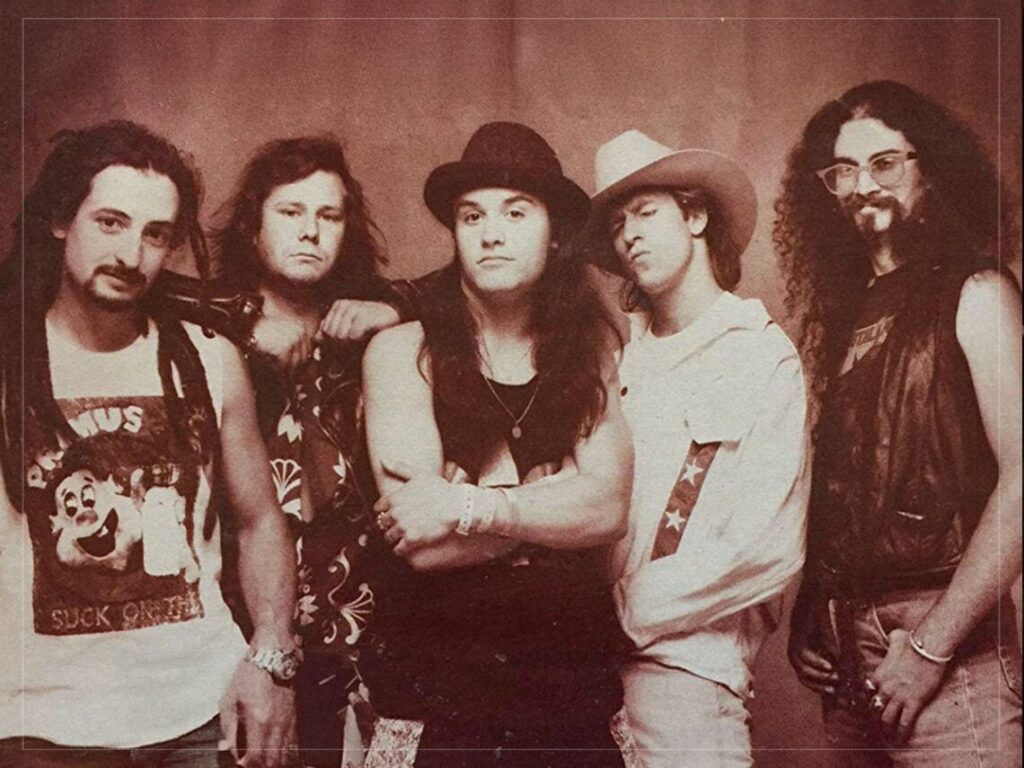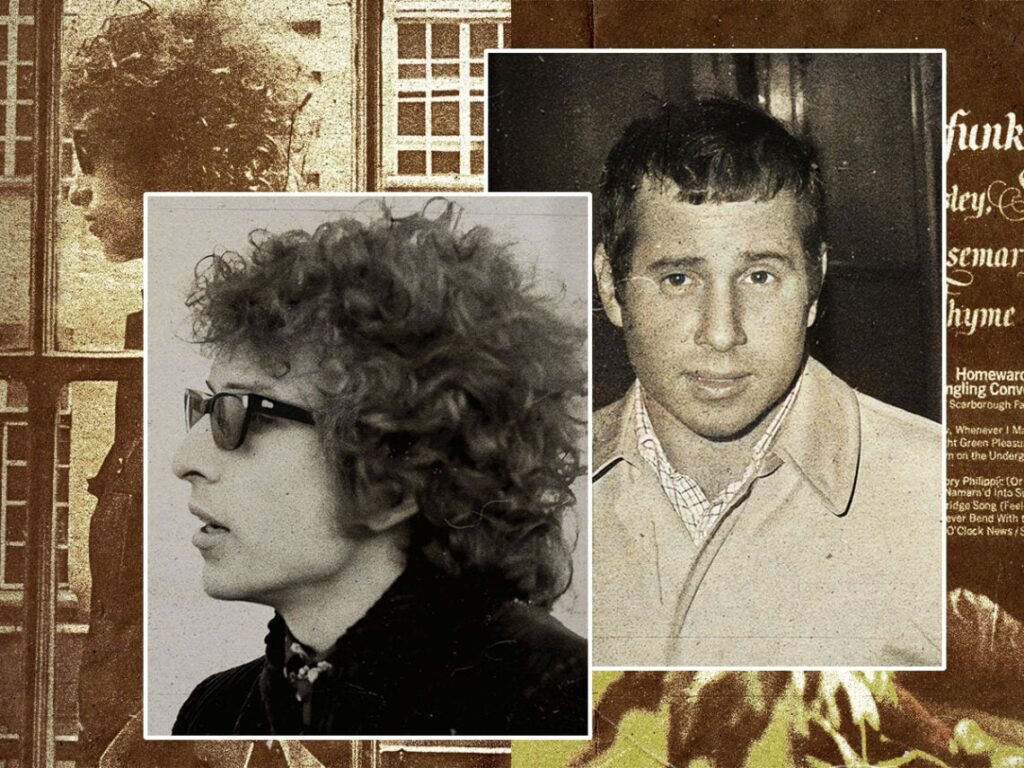A biblical cinematic odyssey: The Joy Hotel and the journey through a debut album
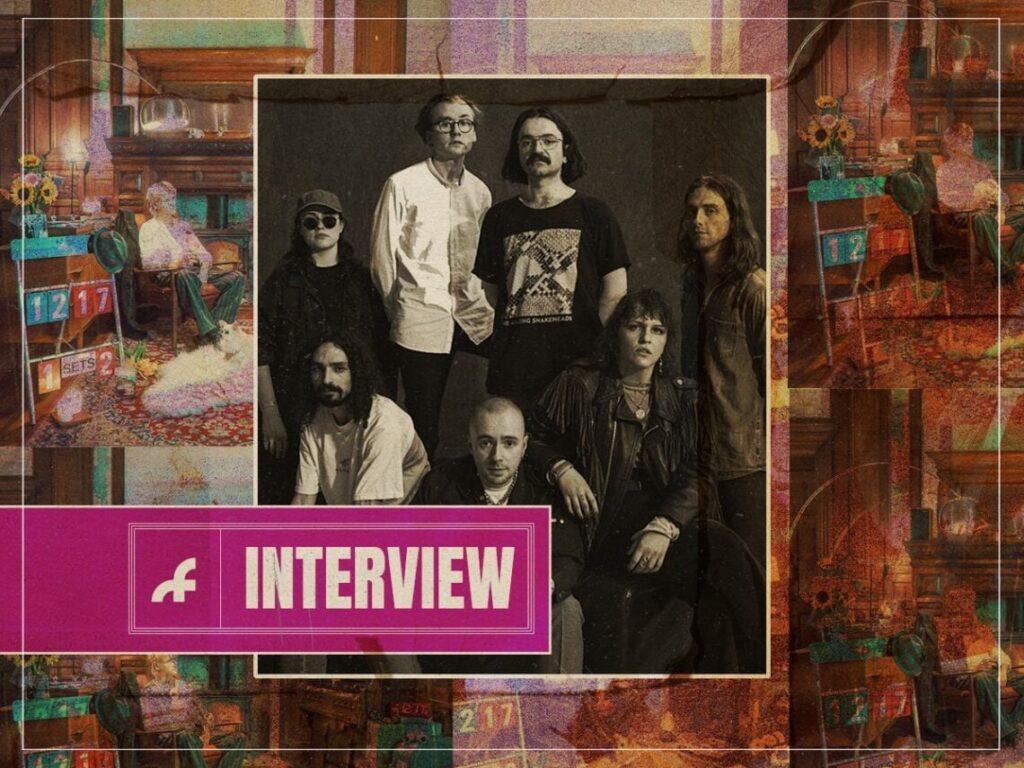 Posted On
Posted On
(Credits: Far Out / The Joy Hotel)
“There’s so much music in the world,” Joy Hotel’s Emme Woods and Luke Boyce tell me from a living room in Glasgow. “We’re beyond the point where genre matters anyway,” Boyce continues. “Pre-internet, genre had huge deep ties to culture, and people would dress in a particular way, and they would listen to a particular kind of music. That was about the flourishing of human identity. Whereas now I think people can listen to anything, and it doesn’t really correlate.”
A slight drum beat is where it all begins. Faint, fragile as the silence, it breaks, taking the listener’s hand and ushering them into Ceremony. Through the door are guitars, drums, bass, melody, rhythm and eccentricity, similar to the beginning of a million albums that came before and a million that will come after, yet this time, they form an introduction to one of the most individual, unique and beautiful debuts ever committed to the airwaves. ‘I Decline’ is the opener for The Joy Hotel’s first album, and The Joy Hotel’s first album is the opening for something much bigger.
Some albums are bad, others are good, but very few feel like a moment, one etched into your memory as the first time you were exposed to a type of music is locked in. ‘I Decline’ has that effect. As the intro shifts past and we’re graced with the glam rock emotive vocals of Emme Woods, the album begins to take shape, and the outline of a song is laid bare. However, where there would be a chorus, there is instead a change in tempo, one that leads from an indie waltz to a montage of people rising in water and floating.
It’s barely 60 seconds, but this is the foundation that Ceremony is built upon, one of what feels like unpredictability, but that is also the only way these songs could ever sound. Tracks are fast, slow, stripped back, all in, done in a way so that they don’t separate themselves from one another but instead feel like an odyssey. It is one of the most cinematic and inspired albums of the year, decade, and history of sound. It’s also a barrage of references.
“That’s more of a song of shagging. Shagging music”. “The apocalyptic, big, expansive nature of the album”. “Billy Joel”. “It’s about love”. “Reference’s to Emme’s love of the Beach Boys”. These are just some of the topics Emme Woods and Luke Boyce brought up in our conversation that show the breadth of this record while still barely scratching the surface. However, one of the biggest tracks on the album deals with the beginning, the end, and all things that people might do in between: ‘Jeremiah’. The song follows two different perspectives during the end of the world, and the ambition on display to try and fit such a complex narrative into a four-minute track sums up the undertaking of the album as a whole.
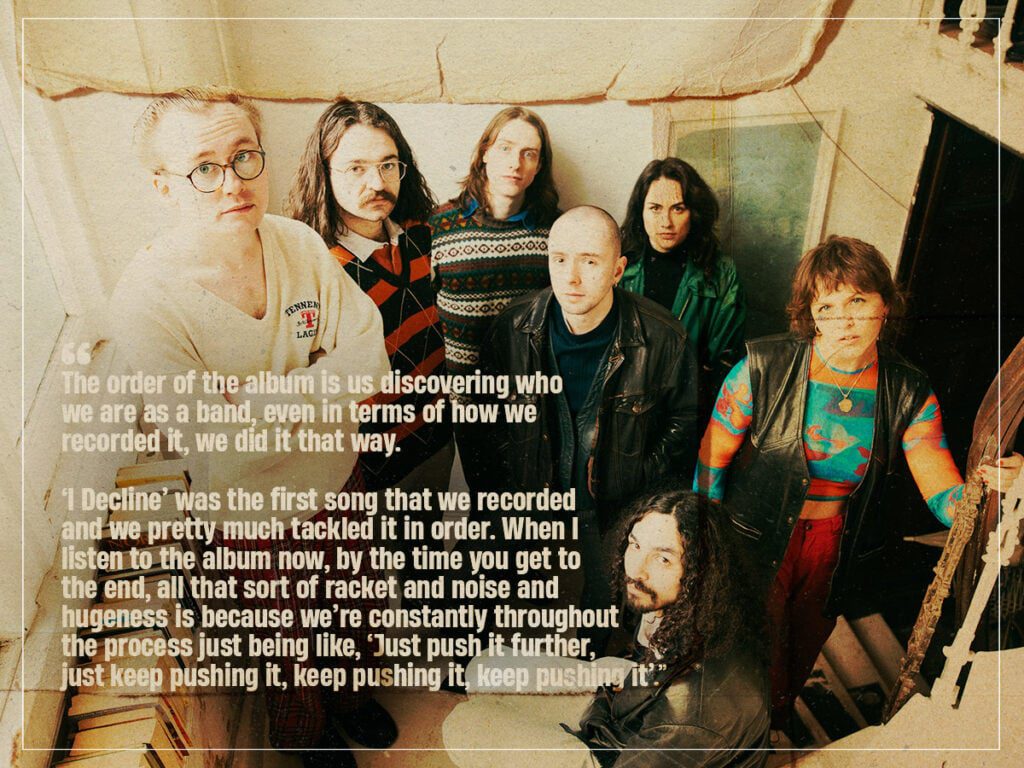
“In the middle of lockdown, my brother had given me the King James Bible,” said Boyce. “I don’t know why. It had never occurred to me before, but I never actually knew how the stories all fit together. Obviously, when you’re in school, and they read all the stories to you, they sort of give you these sections of the Bible, and they don’t really explain what anything means. They just sort of present that to you as if that’s meant to be self-evident”.
“Anyway, I read the Old Testament from start to finish, and then I don’t know what I was reading; it was some article about climate protestors, and they were called ‘Jeremiah’s’, and I was like, I don’t know what that means,” he adds. “It was clearly being used in a derogatory way, but then I got into it and learnt they’re using this term to call people ‘alarmists’ basically when the end of the world wasn’t actually coming.”
Relaying the new with the old, Boyce linked the modern term with the prophet Jeremiah and had the building blocks for a song. “It’s quite interesting, the idea of people being quite anxious about their own mortality, anticipating the end and how people would treat that.”
While the album isn’t made up solely of religious stories, Boyce enjoys the power of the language used in religious texts, and a nod to the verse that discusses Jeremiah is laid out on the album’s cover. “There’s a clock on the right-hand side and a scorecard thing on the left, and they both say 12:17, and that’s the verse, the Jeremiah verse.”
“It’s like, if you don’t listen, you will be smite… what’s the word? Smot? Smite?” Woods says amid spits of laughter.
Other ideas come from a variety of places. Woods tells me that when working on ‘First Joy’, she was inspired by old psychedelic animations. “’First Joy’, I had ages ago,” she said, “I used to sit and write to psychedelic animation and write a score or whatever for it. So, ‘First Joy’, the initial idea came out of that.”
She continued: “It was a deep dive at the end of YouTube. I used to just try and find something. I don’t know what. As a band, we do all the visuals in-house as well, so we’re quite like audio and visual; I feel like they go hand in hand with a lot of our work. And I was super interested in it, so I thought, as a writing tool, watch something trippy and try to make something from it. Songs kind of birthed out of that…there was some person on a wee boat and some things start sprouting out, it was kind of magical.”
Given the number of references that come together to make Ceremony, you would be forgiven for thinking the songs would sound entirely separate from one another, coming together like a compilation instead of a cohesive album, but it’s the opposite. This might just be the easiest album to listen to ever recorded. The variety embedded within the songs, how much they give and take, and sudden changes in tempo and tone mean you hang on to every single second. What you’re listening to isn’t just a band making music but a band discovering themselves over the course of an LP.
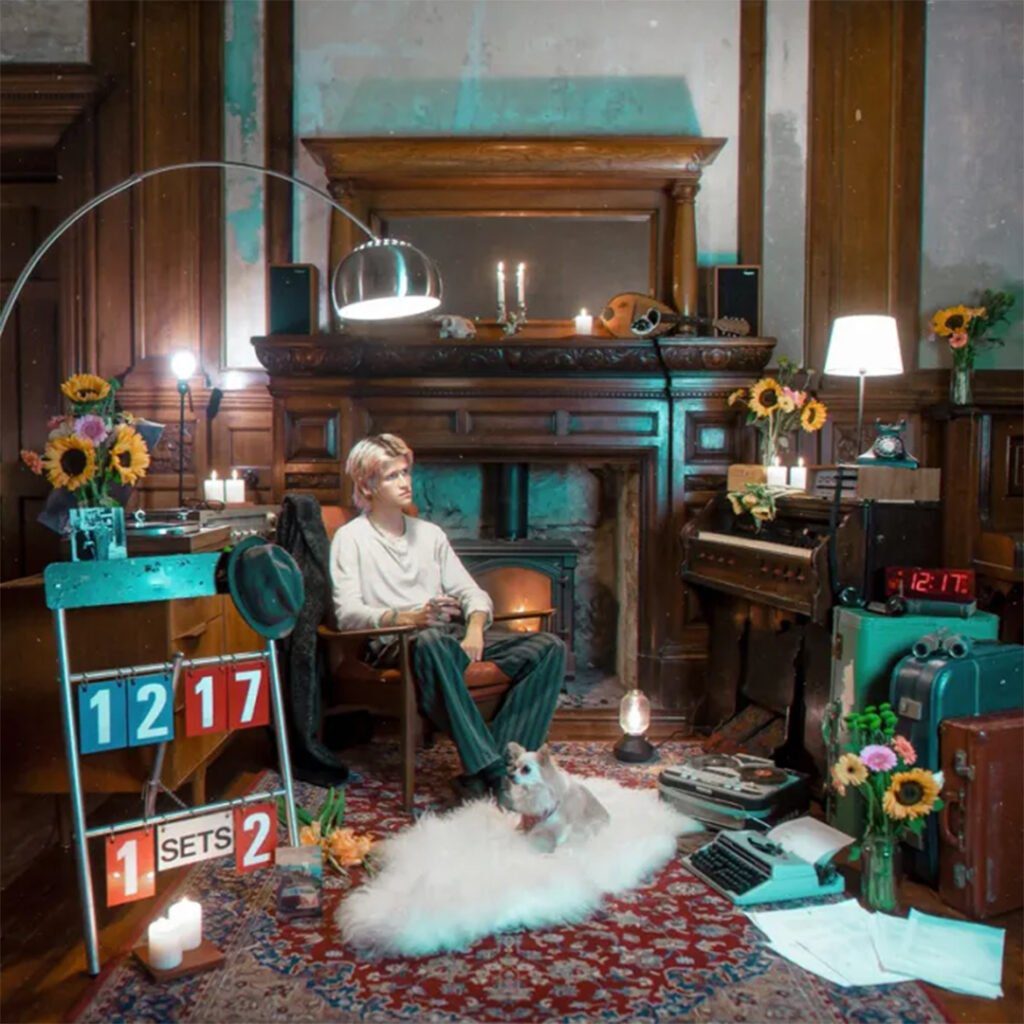
“The order of the album is us discovering who we are as a band,” said Boyce, “Even in terms of how we recorded it, we did it that way. ‘I Decline’ was the first song that we recorded and we pretty much tackled it in order. When I listen to the album now, by the time you get to the end, all that sort of racket and noise and hugeness is because we’re constantly throughout the process just being like, ‘Just push it further, just keep pushing it, keep pushing it, keep pushing it’.”
He continued: “So, then when you listen to it as one big thing, the beginning is sort of like little drum machines, this soft and melodic thing, then by the end, there’s like a minute of hardcore noise and feedback. I think that’s just quite exciting to sort of establish one identity and then completely destroy it by the end of the project.”
Inspiration for structure also stems beyond the realm of sound. Boyce references movies, saying that the approach directors take towards their films is similar to that which the band took towards their album. The intention was never to make something that sounded one note or fit within a specific pocket; instead, listeners should be engaged throughout, which means implementing a cacophony of recording techniques, moments of silence and sounds as simple as breathing.
“Probably the most defining point of the album is that it’s continuous blocks of music,” said Boyce, “The whole concept of a song falls apart when you put them put them together.”
“When we first started writing songs for the band, I was like, ‘This is quite heavy’,” interjects Woods, “And now it’s like, kind of, a bit like twinkly music now… It’s getting a bit heavier and more extreme.”
Boyce summarises, “That range is pretty much essential to good music. If you go and see a film and it’s just on ten the whole way, those big moments don’t mean anything. I think it’s kind of the same thing when you’re trying to consciously pull things back so that when you do let things go and layer instrumentation, it actually matters, and you actually notice it… We’re not just gonna rush through this; we’re gonna stop, and you’re gonna sit there for a minute. The vocal was live on ‘First Joy’, and Emme does this exhale, and it’s a really good moment of just…”
“…Sit down,” finishes Woods.
[embedded content]
Related Topics

